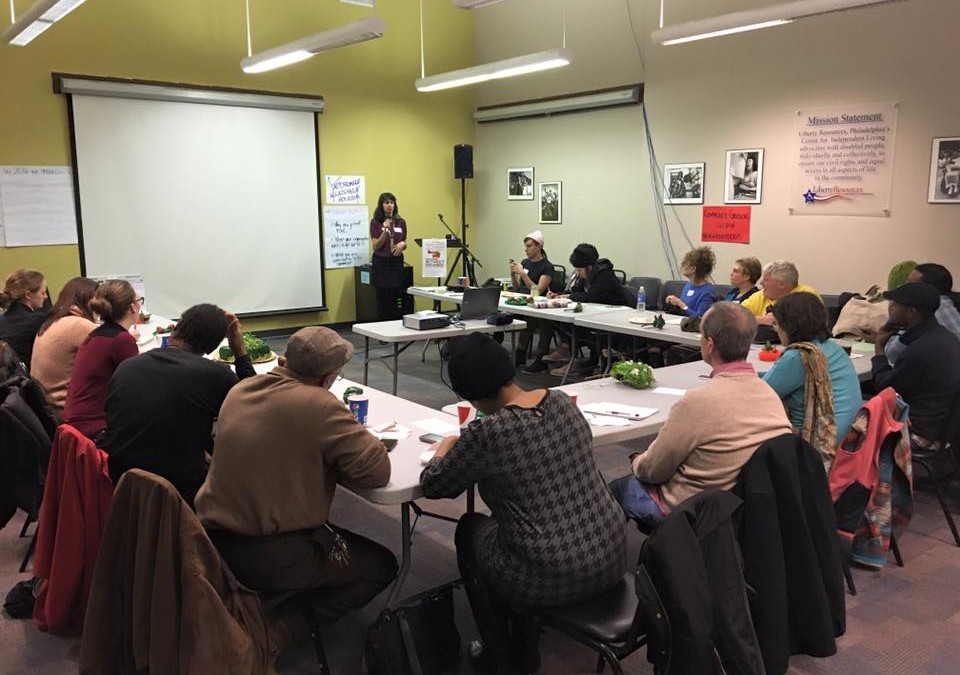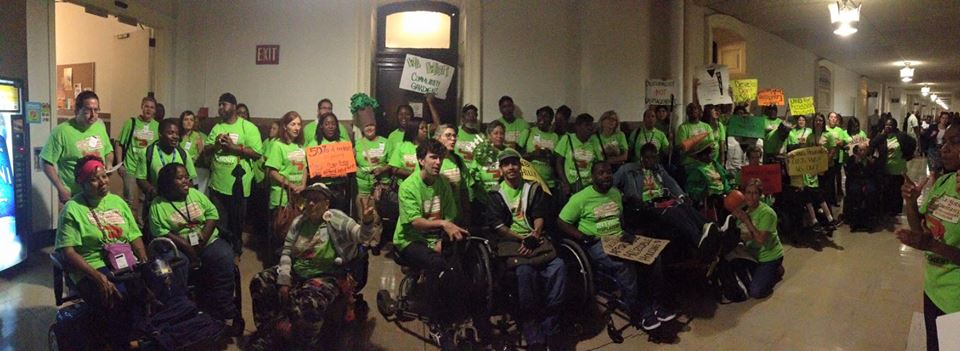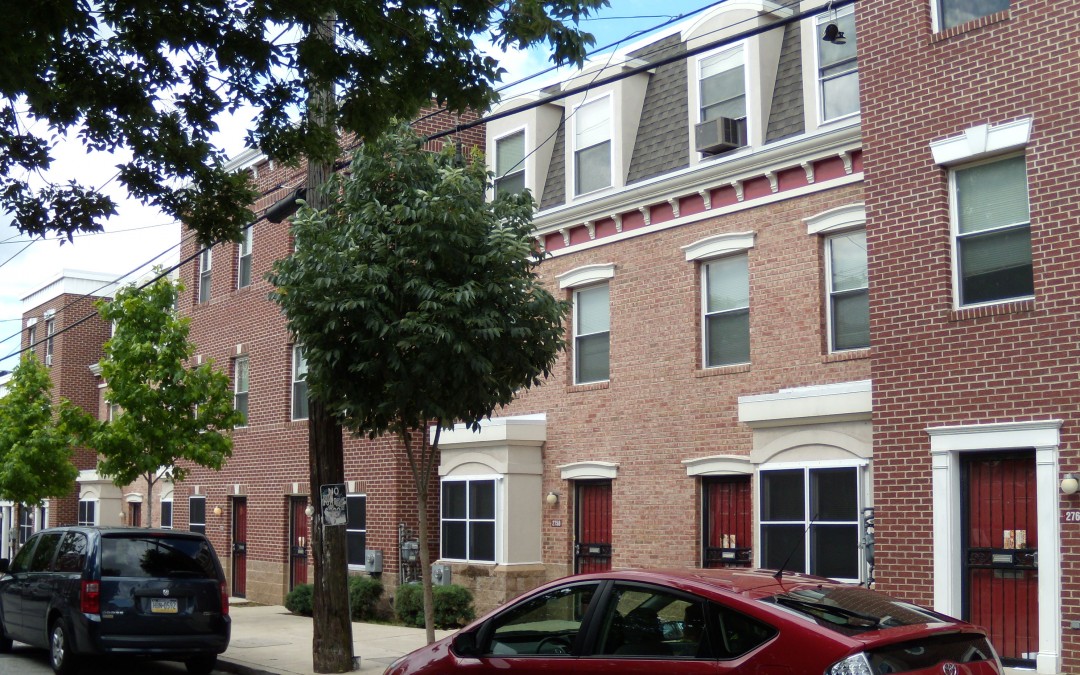
by pcacadmin | Feb 4, 2016 | Affordable Housing, News, Uncategorized
The State of our Coalition in 2015 The Philadelphia Coalition for Affordable Communities’ first membership meeting of the year, held on January 27, 2016, was filled to capacity. Together, we recounted highlights of our work in 2015, and began by celebrating the exciting growth of our Coalition in the past year, from 27 to 44 organizations! We recalled our powerful press conference last March with 150 supporters! There, we unveiled new research and a policy proposal to increase funding to the Housing Trust Fund through an anti-speculation tax on the practice of flipping houses. When City Council reconvened after its summer break, we rallied to urge Council to pass legislation without delay to increase affordable, accessible housing and green space. More than 85 Coalition supporters erupted in chants, demanding to know “Who will be our champion?” Before the meeting, we delivered petitions to Council’s Committee on Housing, Neighborhood Development and the Homeless, with signatures of 2,000 people in support of our demands. Throughout the year, Coalition members continued organizing in our communities and continuing our advocacy. At Housing Trust Fund meetings, we presented our proposal on how we can increase funding and, at Land Bank hearings, we testified on the need to establish specific targets for affordable accessible housing and green space. Housing For All in Washington, D.C. Wins $100 Million for Affordable Housing! Our guest speaker, Elizabeth Falcon, Director of Housing Advocacy at the Washington, D.C.’s Coalition for Nonprofit Housing and Economic Development (CNHED), gave a tremendous presentation on their inspiring Housing For All Campaign. The Campaign began in 2010 at a time of drastic cuts to the...

by pcacadmin | Sep 22, 2015 | Uncategorized
The Philadelphia Coalition for Affordable Housing packed city council chambers on September 10th in an action to remind City Council not to delay passing legislation that would increase affordable, accessible housing and green space. At the drop of council president Clarke’s gavel to start the fall session our sea of 85+ green shirts started chanting. Led by Connie Morrow of the Women’s Community Revitalization Project and Tony Brooks of Disabled in Action, we chanted: “What do we want? Affordable housing! When do we want it? Now! What do we want? Accessible housing! When do we want it? Now! What do we want? Community Gardens! When do we want it? Now! Who will be our champion? Who will be our champion? Who will be our champion?” For the next five minutes, our cries filled the council chambers, echoing demands of dignity and resources for our communities which are experiencing increased levels of market-rate development. These increasing housing costs are burdening our communities. Now is the time for council to take action. This session we expect city council to preserve affordability in Philadelphia by making more resources available for affordable accessible housing and community gardens. An anti-speculation tax on homes bought and sold within two years that provides money to the Housing Trust Fund would make sure real estate development benefits working-class residents. Before the meeting started we delivered over 2,000 petition signatures to the members of the Committee on Housing, Neighborhood Development and the Homeless. We also lined the halls with members holding signs and adorned in vegetables. Our strong turnout could not have been reached without the dedication of our coalition members: 15Now Philly!, Circle...
by pcacadmin | Jun 9, 2015 | Affordable Housing, Displacement, Gentrificaton, Uncategorized
Recently released data from national housing experts paints a troubling picture of housing affordability in Philadelphia. Our report Development without Displacement contains substantial evidence of the real impact a rapidly rising cost of living has exacted on long-term low-income families and individuals, forcing too many to leave and putting countless others at-risk of being driven out. The findings from one of these experts reinforces our report, but another study sheds new light on another at risk population, which is often credited with helping the city rebound after decades of declining population numbers: millennials and recent college grads. The first data set comes from the annual Out of Reach report, produced by the National Low Income Housing Coalition in partnership with the Housing Alliance of Pennsylvania. It shows that in order to afford a modest two-bedroom apartment at fair market rate in the Philadelphia metro area, a worker needs to earn $22.23/hour. Put another way, that means an individual would need to hold 3.1 full-time jobs at the current $7.25/hour minimum wage just to afford a place to live. Even recent proposals to raise the minimum wage to $15/hour would be insufficient! (The full version of that report can be found here) Trulia also released an analysis of affordability for recent college grads in large metro areas. It says that the income they need to afford median rent in Philadelphia rings in at $56,870. What makes that so troubling is that median income for new grads here is only $27,840 – less than half of what they are said to need. (The full version of that report can be found...

by pcacadmin | May 14, 2015 | Election, Philadelphia, Uncategorized
The Primary Election is next week (Tuesday, May 19th) and Philadelphians have an opportunity to elect (or re-elect) members of City Council, along with a new Mayor. Who gets elected will have a profound impact on the future of our city, as they will decide which policies get enacted – and which don’t. Two of our Coalition’s steering committee members, Nora Lichtasch and Tom Earle, co-wrote an op-ed in the Philadelphia Daily News reminding voters to choose leaders with public-policy goals that encourage equitable community development and represent plans that include people of all income levels in the future of our neighborhoods. Their words are critically important to keep in mind when you head to the polls on Tuesday. Our Coalition has put a proposal forward to expand and protect affordability in gentrifying neighborhoods by applying a 1.5% Anti-Speculation Tax on ‘flipped houses’ (those bought and resold within 24 months). It has the potential to generate up to $12 million in additional revenue for the Philadelphia Housing Trust Fund that can literally change thousands of lives. Since its inception in 2010, the Housing Trust Fund has dedicated 50% of its proceeds to improving housing options for families earning less than $20,000 per year and has provided housing opportunities to more than 14,000 low- and moderate-income families, seniors, disabled, and homeless people to date. We found that in 2013, more than 6,000 real estate transactions in the City fit the description of flipped houses, at an estimated total value of $782 million. In addition to that figure clearly indicating a very profitable business practice, many of those transactions were discovered...




